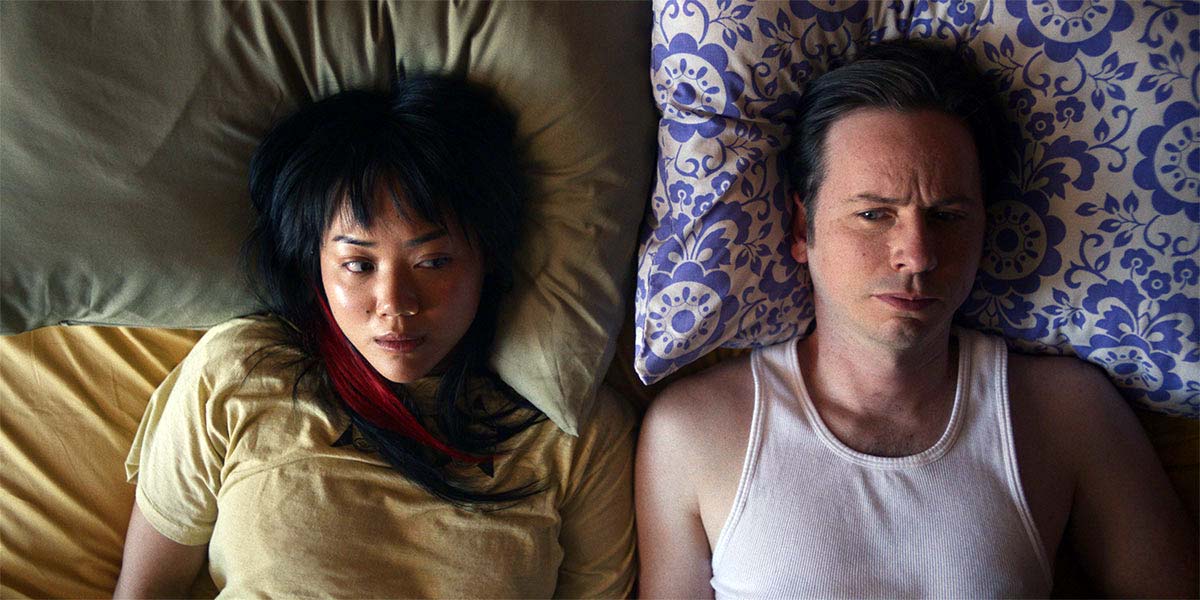As far as breakups go, cartoonist Chester Brown (And Beirne) faces a relatively soft blow. In the early moments of Sook-Yin Lee’s “Paying For It,” he wakes up next to his then-girlfriend, Sonny (Emily Le), who announces that she thinks she’s begun to fall in love with another man. She’s looking for acceptance to see “where this goes.” Chester, almost inhumanely agreeable, acquesses. Sonny still loves Chester, after all. But that’s just one piece of Lee’s film to which she has personal ties — as she’s the “Sonny” in question. Adapted from the real-life Brown comic of the same name that explored his decision to start frequenting sex workers after his breakup with Lee, the film opens up the conversation of monogamy, sexual and romantic relationships, and enduring friendships.
READ MORE: TIFF 2024 Preview: 21 Must-See Films To Watch
The film follows Chester and Sonny as they both navigate their new relationships. It begins as an open relationship before reverting to platonic — though Chester still lives in her house, just in the basement instead of beside her in bed. One of the best aspects of Lee and Joanne Sarazen’s script is how it deftly handles Chester’s switch from his relationship to his desire to only pay for sex. It never feels like a result of the breakup itself. He’s not a jilted ex-lover. Instead, the breakup only illuminates his disinterest in a romantic partnership. Paying for sex is only logical to him.
Where the original comic by Brown focuses on his journey while obscuring the faces of the prostitutes he has sex with, “Paying For It” grants the women more interiority and personality. Without this addition, the film quickly could’ve fallen into a pattern of indifference, as we watch an introverted man boast about his sexual escapades, deeming romance as a lesser form of relationship as it ascribes a level of ownership onto the patterns. By opening it up to the sex workers as well as Sonny’s own romantic entanglements, the film allows a greater observational sphere.
There’s an unfussy quality to Lee’s approach to the material, with nothing overly showy. With each new boyfriend or prostitute, there’s a title card, which grants the overall structure an episodic feel. There are a lot of exciting ideas, and the writing is strong, but it’s let down by lackluster direction. It’s the most visually engaging when the characters are in Sonny and Chester’s home, as it has the most lived-in quality, and the set design is perfectly chaotic.
Like the breakup that sets the story up, the stakes are all relatively low — especially concerning Chester’s storyline. The film makes sure to paint him honestly, with Sonny calling him out on any nonsense once she learns of him paying for sex. There’s fear, at first, that the depiction of Chester’s awakening and quiet content contrasts negatively with Sonny’s string of lousy boyfriends. In other writers’ hands, it could feel like some karmic retribution towards her, especially as characters take pains to tell us just how friendly Chester is. Instead, in the hands of Lee and Sarazen, the film engages with Sonny’s serial need to be in a relationship versus Chester being happy on his own.
It’s still a shame that Sonny doesn’t receive the same amount of screen time as Chester, if only because her story is so naturally engaging as she navigates the messiness of love. The tumultuous nature of her relationships and how she tries to find herself through the men she dates while holding on to a career that’s long met her engagement expiration date paint a fully formed character and the perfect foil for Chester.
There’s a lot of frank humor throughout. For a movie about sex, the sex scenes themselves are shot with near unappealing frankness. This is likely the point, as it highlights the transactional nature versus the moments of genuine emotional intimacy. A scene where Chester and Sonny embrace one another has much more warmth than some of Chester’s random hookups, shot with a soft glow in contrast to the stark lighting that bathes his experiences as a John. But the sex scenes also allow for character-driven comedy that demonstrates the initial awkwardness Chester experiences while refusing to make a joke at the expense of sex work itself.
Lee delivers a charmingly contemplative though visually sterile adaptation that is sex-positive and filtered through the female gaze despite the original perspective. With a distinctive voice that captures the contrasting desire for companionship with strictly carnal, no-strings-attached intimacy, the biggest triumph of “Paying For It” is the empathy it shows the sex workers themselves. Late in the film, a woman states plainly, “I f*** for money, and I enjoy it.” The film isn’t trying to be overtly political, but the straightforward delivery of that sentiment is radical in and of itself. (B)
Get complete coverage from the 2024 Toronto International Film Festival on the Playlist here.
Source link
#Paying #Review #Director #SookYin #Lee #Explores #Monogamy #Relationships #Sexual #Freedoms #TIFF

